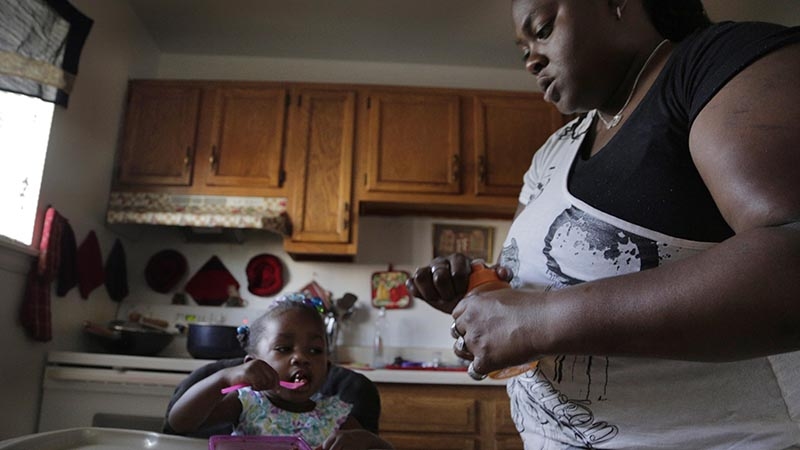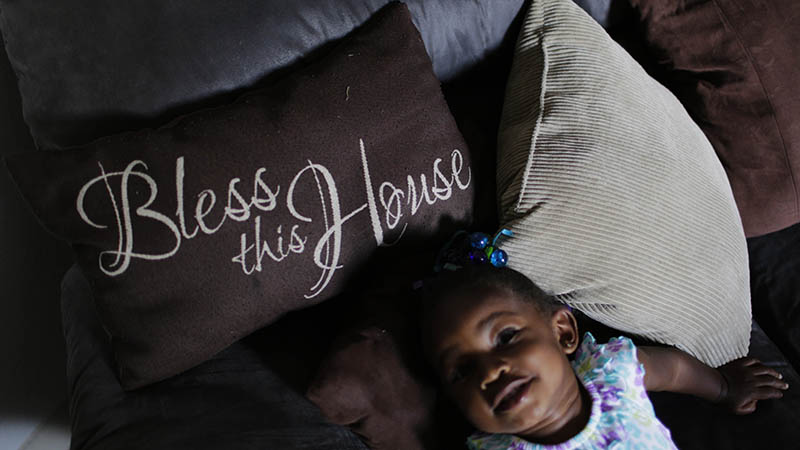
Sharday Cooks and her daughter rent an apartment through Denver’s housing first program. Cooks has lived there for two years, after a decade of homelessness. Photo by Joe Mahoney
Sharday Cooks and her daughter rent an apartment through Denver’s housing first program. Cooks has lived there for two years, after a decade of homelessness. Photo by Joe Mahoney
By Anna Boiko-Weyrauch
When Sharday Cooks’ mom died, Sharday was 19 and her life started spiraling out of control. She remembers how she became homeless: Someone passed her a pipe she thought was filled with marijuana, she said. It was crack.
Cooks liked it because it took her pain away. “I felt like I was sucked in, grieving over my mom,” she said.
Cooks’ life looks different today. After 10 years of being homeless and addicted, working as a prostitute on Colfax Avenue, she’s sober, housed and works for the Colorado Coalition for the Homeless. At a day shelter in downtown Denver, she passes out pastries, bagels and encouragement to folks who stop by.
When Cooks finishes work, she goes home to an apartment she started renting two years ago through the Coalition’s “housing first” program. Cooks remembers the exact date she moved in—July 31, 2014—because it was such a big milestone.
“This is what I want to be proud of, because I did it,” she said.
The housing first model that Cooks benefited from is gaining popularity and recognition across the country, but it’s not new to Colorado. In 2003, Denver Human Services received its first funding for housing first programs in the form of a five-year, $2 million grant.
This year, Denver received the largest amount of funding yet for its approach—$4.2 million across two grants—to pay housing and support costs for 400 homeless people, including the disabled, youth, veterans, seniors and people with severe mental illness.
The city’s human services agency administers the funds, which come from the U.S. Department of Housing and Urban Development (HUD) and support programs at five service providers: Colorado Coalition for the Homeless, Colorado Health Network, the Empowerment Program, Mental Health Center of Denver and St. Francis Center.
Other cities, Salt Lake City in particular, have gotten attention for their programs that provide housing and support services for chronically homeless people. Utah attributed a 72 percent decline in chronic homelessness in the state between 2005 and 2014 in part to a housing first approach.
In 2015, HUD incentivized housing first programs in its criteria for Continuum of Care grants, which specifically fund public and nonprofit agencies providing housing and assistance to homeless people.
The idea is to provide chronically homeless people both an apartment and the support they need to keep it, including mental health and substance abuse treatment, job skills and case management. The approach is part of Denver’s plan to end homelessness called “Denver’s Road Home.” (The Trust provided funding to this program as part of a 2006-10 grant.)
Housing first is a philosophy that works, Denver’s Road Home Executive Director Bennie Milliner said, and projected that the practice would continue. The approach is based on an understanding that housing providers shouldn’t extend services and benefits as a “carrot” for chronically vulnerable people to keep their housing, Milliner said. In other words, whether or not a chronically homeless person is successful at drug treatment, for example, or another demand imposed by a program, they won’t have to go back on the streets.
“Many of them don’t have the capability to meet those demands when they’re worrying about where they’re going to be staying and sleeping and eating,” he said.
Health and homelessness are closely linked: certain illness, like mental illness and addiction, can cause homelessness, and living in unstable housing or on the streets can cause or exacerbate health problems.
Researchers have documented health disparities between housed and homeless people since the 1980s, and found the homeless were more likely to have diseases such as high blood pressure, tuberculosis, HIV/AIDS, mental illness, obesity, hepatitis C, diabetes and cancer. Compounding these challenges is the fact that homeless patients are less likely to access the care they need and more likely to visit the emergency room as their primary source of care. Researchers have found high rates of unmet health care needs for surgery, eyeglasses, dental care, prescription medicine and mental health counseling among homeless populations. Studies have also found that poor people and those with substance abuse issues are more likely to become homeless.
Homelessness in Colorado disproportionately affects men and people of color. Data on the number of homeless people at a single point in time last year in Colorado found 60 percent were male, nearly 30 percent were Latino and nearly 20 percent of were black—while the state’s population was nearly 20 percent Latino and 5 percent black, according to the U.S. Census Bureau.
Cooks knows the toll such instability can have on health; she says her addiction was killing her slowly and she didn’t care about her well-being.
“It was more of a survival thing, having a place to stay at night, having food, whatever it was,” she said. “If it was a candy bar or pop and chips, I meant to get full off of it.”
Now Cooks has a diagnosis of severe depression, anxiety and attention deficit disorder, and takes medication that she says keeps her “calm, cool and collected.”
Housing First in Denver
The Colorado Coalition for the Homeless launched the Denver Housing First Collaborative in 2003 with 100 clients, adding 100 more in 2005.
Some of the original clients are still in the program, said Lisa Thompson, who directs the Coalition’s housing first program.
Potential clients are referred to the program by a variety of service providers (for Cooks, it was the courts after she was arrested for prostitution by undercover police officers). Once accepted to the program, the new tenants get vouchers to rent from private landlords or from one of the properties managed by the Coalition. The vouchers allow tenants to pay 30 percent of their income toward rent; if they don’t have income, they don’t pay rent.
But it’s more than just giving people keys to an apartment.
“My friends are like, ‘Oh, you build housing and put people in it.’ That is a piece of it,” Thompson said. Housing first tenants have a team of professionals to help them address the causes of homelessness and adapt to life in an apartment.
Clients need diverse support, including mental health and substance abuse treatment; applying for social security benefits; learning how to get a landlord’s help when the plumbing breaks; and how to shop for groceries and stock a pantry.
“Otherwise, people won’t maintain their housing,” Thompson said.
To calculate the costs and benefits of the program, the Coalition studied the emergency room and health care records of program participants before and after they received housing. In 2006, the Coalition published the outcomes: the program had saved the city approximately $600,000 in emergency department costs, or an average of $31,545 per person. Most participants, 77 percent, continued to have housing two years after they entered the program, and half had documented improvements in health.
Similar programs have also demonstrated success. Some recent research:
The impact on Cooks’ life is apparent by the tears that well up in her eyes when she talks about bringing her newborn daughter, Queen Trinity, home to her apartment. Queen Trinity, almost two years old now, enjoys frequent movie nights with her mom at home and goes to preschool one short bus ride away.
The apartment was key for Cooks to get her life on track.
“It made me feel like I’m human again,” Cooks said.

The Colorado Trust is a foundation that works to advance health equity for Coloradans. Housing status and access to care are two of the many social determinants of health that contribute to health inequities in our state.